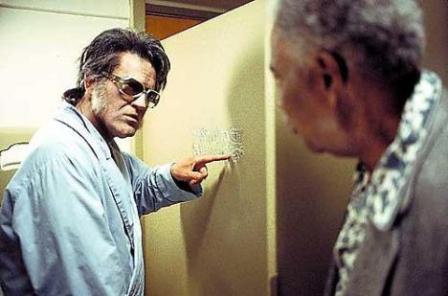
Die Hard is the greatest action film of all time. The end. No debate.
It works wonderfully, through great acting, fantastic set pieces, great cinematography, pre-CGI special effects that look utterly realistic and a barnstorming script.
In every area, the film excels itself, and provides a benchmark for all other action films. One area crucial to the genre is pacing. Films, like Speed, try and keep tension at a high pitch throughout, but often end up burning themselves out three-quarters of the way in. Die Hard takes a couple of breathers, when John McClane has doubts, but the tension remains, largely because of the vulnerability of our hero - he is half dressed and without shoes, never mind being outnumbered and outgunned.
When it first arrived in 1988 (or arrived on VHS in 1989 for me!) it was light-years ahead of the competition. The Hollywood action film of the 1980s seemed to largely comprise of an invincible over-muscled lunk (usually in a jungle) stood on the spot with an enormous machine gun mowing down armies of bad guys running towards him. Not only did Die Hard have a guy with a (fairly) regular physique, it pared down the number of bad guys that enabled you to count them off as the film progressed, it also turned the action into a game of cat and mouse, with Bruce Willis very much the mouse: always on the run from one hiding place to the next. John McClane was no emotionless man-mountain, but a regular guy who realised the odds were strongly against him, cried when in pain, voiced his doubts when in trouble.
Emphasising this “regular guy” approach to the movie, every layer of seniority or management in the film is shown as being wrong, lazy and stupid. Whether it’s the media, SWAT teams, the FBI or Dwane T. Robinson: if you’re earning more than average wage, you’re a jerk. And who doesn’t love to see jerks getting their dues?
On the flip side of the hero, is the bad guys. And Alan Rickman presented no ordinary moustache-twirling villain: Hans Gruber was smart, classy and funny. In fact, if he wasn’t so keen on killing innocent members of the public and police forces, he’d be good enough to be a hero. The henchmen are all equally as good, and even in their brief on screen time, they each manage to create a unique character. This is where Die Hard plays it’s best kept secret. It’s not just an action film. It is also a heist film. And we want to see the bad guy’s do their “one last job”. Part of us wants them to succeed - when they get into the vault, and the music breaks into Beethoven’s Ode to Joy, we pump a fist into the air with them.
And, as a finale, we get a great big tall building blowing up. And a man jumping off it. Being shot at from a helicopter. Which also blows up. What more could you want?




